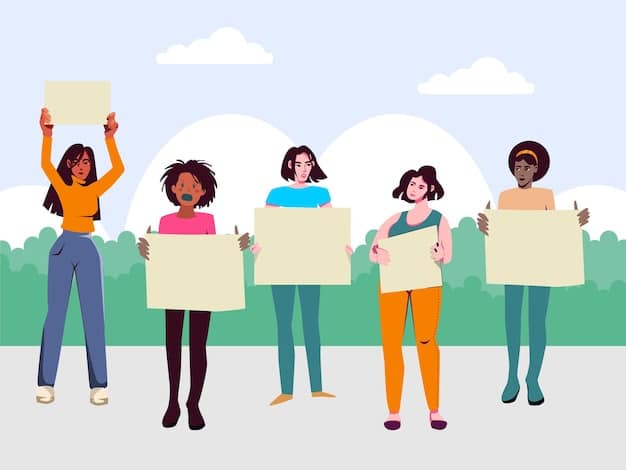Practical Solutions: Advocate for Racial Justice in Your Community in 2025

Advocating for racial justice in your local community in 2025 involves practical solutions such as supporting local organizations, engaging in policy advocacy, promoting inclusive education, fostering community dialogues, and holding institutions accountable for their diversity and inclusion efforts.
In 2025, advocating for racial justice in your local community requires actionable strategies and a commitment to change. Discover practical solutions: how to advocate for racial justice in your local community in 2025 to create meaningful impact.
Understanding Racial Justice and Its Importance
Racial justice is the proactive reinforcement of policies, practices, attitudes and actions that produce equitable power, access, opportunities, treatment, impacts and outcomes for all. It is about creating a society where race no longer determines one’s opportunities or life outcomes. Why is this so important? Because racial inequality persists in many areas of life, from education and employment to housing and healthcare.
Addressing racial injustice requires a multi-faceted approach. Understanding the historical context of racial inequality is really critical for the overall comprehension on our society. Recognizing systemic barriers and promoting inclusive practices can help to reduce disparities and create a more equitable society.
The Persistence of Racial Inequality
Despite progress in civil rights, racial inequality continues to plague many communities. Understanding the forms this inequality takes is crucial step to develop effective solutions. This includes disparities in income, healthcare, and education.
The Role of Community Advocacy
Community advocacy plays a vital role in advancing racial justice. Grassroots movements and local organizations can influence policy, raise awareness, and create supportive networks.
- Supporting local initiatives working to promote racial equity.
- Participating in community dialogues and workshops.
- Holding local institutions accountable for their diversity and inclusion efforts.
In summary of this section, understanding the meaning of racial justice, recognizing the persistent inequality, and appreciating the role of community advocacy are just the first steps towards creating meaningful change. Community advocacy is central to addressing these issues.

Supporting Local Organizations and Initiatives
One of the most effective ways to advocate for racial justice is to support organizations already working on the front lines. These groups often have deep roots in the community and a clear understanding of local needs and challenges. This can involve financial contributions, volunteering time, or helping to raise awareness about their work. So, how can we help to grow these organizations?
Local organizations often operate with limited resources and have specific needs such as funding, volunteers, and in-kind donations. Identifying these needs and offering support can significantly boost their effectiveness.
Identifying Key Organizations
Research local organizations dedicated to racial justice. Look for groups that address issues such as education, housing, criminal justice reform, and economic opportunity. Some ways you can find these organizations are through a quick web search, or on social media.
Forms of Support
Support can take many forms, each contributing to the organization’s capacity and impact. This can include financial contributions, volunteering time, or raising awareness about their work. There are numerous ways you can assist.
- Donating to local racial justice organizations.
- Volunteering your time and skills.
- Participating in their events and campaigns.
- Helping with fundraising efforts.
Supporting local organizations is an essential way to contribute to racial justice in your community. By providing financial assistance, volunteering time, and spreading awareness, you can help these organizations do their work and create lasting change.
Engaging in Policy Advocacy
Policy advocacy involves working to influence local laws, regulations, and policies that affect racial equity. This can include advocating for equitable funding in education, fair housing policies, criminal justice reform, and other initiatives that address systemic inequities. Policy advocacy at the local level is a powerful tool for advancing racial justice.
Engaging in policy advocacy requires understanding the local political landscape, identifying key decision-makers, and building coalitions with other community members and organizations. Staying informed about current policy debates and proposed legislation is crucial to be able to participate effectively.
Understanding Local Policies
Familiarize yourself with local policies related to education, housing, employment, and criminal justice. Look for areas where policies perpetuate racial disparities.
Contacting Elected Officials
Reach out to your elected officials to express your concerns and advocate for specific policy changes. This can be done through emails, phone calls, and meetings.
- Attending city council meetings and voicing your concerns.
- Writing letters to your elected officials.
- Participating in advocacy campaigns and rallies.
Engaging in policy advocacy is a significant step toward achieving racial justice in your community. By understanding the local political landscape, contacting elected officials, and supporting advocacy campaigns, you can amplify your voice and drive policy changes that promote equality and justice.
Promoting Inclusive Education
Education plays a critical role in shaping attitudes and perceptions about race. Promoting inclusive education means advocating for curriculum and teaching methods that are culturally responsive, anti-racist, and inclusive of diverse perspectives. Inclusive education helps to foster understanding, empathy, and respect among students of all backgrounds. When we have diverse and inclusive classrooms, we have more well-rounded humans.
Inclusive education is not only about what is taught but also how it is taught. Creating a supportive and inclusive classroom environment where all students feel valued and respected, encouraging conversations about race and identity, and empowering students to challenge stereotypes and biases are key components.
Advocating for Diverse Curriculum
Push for curriculum that includes the history, literature, and contributions of people from diverse racial and ethnic backgrounds. Ensure that the curriculum accurately reflects the experiences of marginalized communities.
Supporting Anti-Bias Training for Educators
Encourage schools to provide anti-bias and cultural competency training for teachers and staff. This training can help educators recognize and address their own biases and create a more inclusive learning environment. Training is a key element to becoming successful in this process.
- Volunteering in schools to promote diversity and inclusion.
- Supporting organizations that provide educational resources on racial justice.
- Advocating for policies that promote equitable funding for schools in all communities.
Promoting inclusive education is a long-term investment in racial justice. By actively pushing for diverse curriculum, supporting anti-bias training for educators, and engaging in community initiatives, you can contribute to creating a more equitable and enlightened educational system.

Fostering Community Dialogues and Understanding
Creating spaces for open and honest conversations about race is essential for fostering understanding and healing within the community. These dialogues provide opportunities for people to share their stories, learn from one another, and build bridges across racial divides. Structured dialogues can promote empathy.
Organizing community events that highlight diverse cultures, histories, and perspectives can help to break down barriers and promote appreciation for different racial and ethnic groups. These events can range from cultural festivals and film screenings to panel discussions and workshops. Engaging with people from different backgrounds can broaden your understanding of race and inequality.
Organizing Community Forums
Host community forums and workshops where people can discuss issues related to race, racism, and racial justice. Create a safe and respectful environment where everyone feels comfortable sharing their thoughts and experiences.
Participating in Cross-Racial Conversations
Seek out opportunities to engage in conversations with people from different racial backgrounds. Listen to their perspectives and share your own experiences.
- Attending community events that celebrate diversity.
- Joining or starting a book club that focuses on books about race and identity.
- Volunteering in diverse community organizations.
Fostering community dialogues and understanding is vital for building a more inclusive and equitable society. By organizing community forums, participating in cross-racial conversations, and attending cultural events, you can contribute to creating a more understanding and compassionate community.
Holding Institutions Accountable
Holding institutions accountable for their diversity and inclusion efforts is a key step toward achieving racial justice. This involves monitoring the policies and practices of institutions such as schools, workplaces, and government agencies, and advocating for changes when necessary. These organizations always need holding accountable for their acts.
Transparency is important in accountability. Requesting data on diversity and inclusion and publicly reporting on the progress (or lack thereof) can pressure institutions to take action to do better. When the public is informed about the organizations progress, more change is likely to happen.
Monitoring Institutional Policies
Examine the policies and practices of local institutions to identify areas where they may be perpetuating racial inequities. This can include hiring practices, admissions policies, and disciplinary procedures.
Advocating for Change
Work with community members and organizations to advocate for changes that promote diversity, equity, and inclusion within these institutions. This can include demanding more diverse representation in leadership positions, implementing anti-bias training programs, and reforming discriminatory policies.
- Filing complaints with government agencies when you observe discriminatory practices.
- Supporting candidates for public office who prioritize racial justice.
- Organizing protests and demonstrations to raise awareness about institutional racism.
In conclusion, holding organizations accountable requires staying informed, organizing collectively, and using different strategies to hold them accountable. Transparency is key to pressure the institutions to do better. Through advocacy, the goal is to develop equality within the organizations.
| Key Actions | Brief Description |
|---|---|
| 🙌 Support Local Orgs | Donate, volunteer, or raise awareness for local racial justice organizations. |
| 🗣️ Policy Advocacy | Advocate for equitable policies by contacting elected officials and attending meetings. |
| 🌱 Inclusive Education | Promote diverse curriculum and anti-bias training in local schools. |
| 💬 Community Dialogues | Create safe spaces for discussing race, racism, and racial justice. |
Frequently Asked Questions
▼
Racial justice is the proactive reinforcement of policies, practices, attitudes, and actions that produce equitable power, access, opportunities, treatment, impacts, and outcomes for all.
▼
You can support local organizations by donating, volunteering your time, attending their events, and helping with fundraising efforts. Every type of assistance counts!
▼
Policy advocacy involves contacting elected officials, attending city council meetings, writing letters, and participating in advocacy campaigns to influence local laws and policies.
▼
Promote inclusive education by advocating for diverse curriculum, supporting anti-bias training for educators, and volunteering in schools to promote diversity and inclusion.
▼
Community dialogues foster understanding and healing by providing opportunities for people to share their stories, learn from one another, and build bridges across racial divides.
Conclusion
Advocating for racial justice in your local community in 2025 requires a multifaceted approach that includes supporting local organizations, engaging in policy advocacy, promoting inclusive education, fostering community dialogues, and holding institutions accountable. By implementing these practical solutions, you can contribute to creating a more equitable and just society for all.





